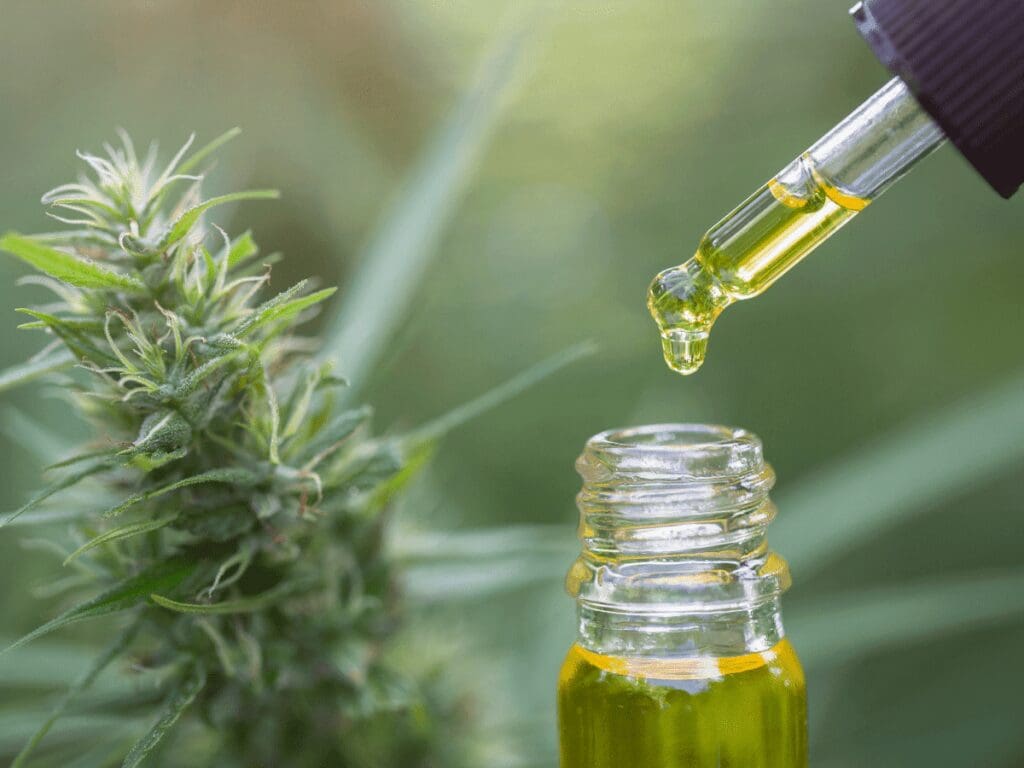Key Takeaways:
- CBD Oil’s Anti-Inflammatory Action: CBD oil interacts with the body’s endocannabinoid system to reduce inflammation naturally, making it a promising alternative for those seeking relief without traditional medication’s side effects.
- Versatile Application and Products: CBD oil can be used in various forms, including topicals, edibles, and tinctures, offering tailored treatment methods for different types of inflammation and preferences.
- Safety and Efficacy: While CBD oil is generally safe, consulting with a healthcare professional is crucial, especially for individuals with existing health conditions or those taking other medications. If you’re seeking topical relief, Happy Hemp’s CBD Topicals offer a soothing solution for skin and wellness needs. Discover the benefits of CBD combined with menthol for effective pain and inflammation relief by exploring Happy Hemp’s range of CBD Topical products.
CBD oil, a natural remedy from the cannabis plant, is growing in popularity for its anti-inflammatory benefits without the high associated with marijuana. This guide discusses how CBD oil, rich in cannabinoids but free from psychoactive effects, is an effective option for managing inflammation—a key factor in many chronic conditions. It highlights CBD oil’s therapeutic properties and safety, offering insights into using it for health and wellness. For those experiencing pain, Happy Hemp’s CBD Oil for Pain could be a natural, effective solution worth considering.
Find Your Happy Place With Happy Hemp
Start your journey towards a more balanced life with Happy Hemp. Click through to explore our full spectrum of CBD solutions at Happy Hemp and embrace a happier, healthier you, today. With nature’s best at your fingertips, why wait for relief? Find your serenity now. |
What Is CBD Oil? Exploring Its Nature And Benefits
Understanding CBD Oil
Derived primarily from the hemp plant, CBD oil is a natural extract distinct from marijuana, mainly due to its low levels of THC, the compound causing psychoactive effects. This makes CBD oil a non-intoxicating alternative for individuals seeking the medicinal benefits of cannabis without experiencing mind-altering effects.
The Extraction Process
Extracting CBD oil involves separating cannabidiol from the rest of the plant material. CO2 extraction is one of the most advanced and cleanest methods. It eliminates the need for harsh chemical solvents, ensuring a high-quality, THC-free product that maintains the plant’s beneficial compounds.
Therapeutic Properties And Health Benefits
CBD is lauded for its extensive therapeutic properties, significantly its anti-inflammatory effects. By interacting with the body’s endocannabinoid system, CBD oil can help modulate responses related to pain, immunity, mood, and sleep. This interaction contributes to CBD oil’s effectiveness in treating conditions like chronic pain, anxiety, and, importantly, inflammation.
Beyond Inflammation: Additional Benefits
Aside from combating inflammation, CBD oil is beneficial for overall wellness. It has been found to improve sleep quality, reduce anxiety levels, and enhance mood. This makes it an attractive option for those pursuing a holistic approach to health, seeking natural alternatives to traditional pharmaceuticals.
Why Choose CBD Oil For Inflammation?
Natural Anti-Inflammatory Properties
Known for its natural anti-inflammatory properties, CBD oil presents a safe alternative to NSAIDs and avoids their adverse long-term effects. By interacting with the body’s endocannabinoid system, it reduces inflammation and pain without the common side effects of traditional medications.
Versatility In Treatment
One of the compelling reasons to choose CBD oil for inflammation is its versatility. It can be used to treat a broad spectrum of inflammatory conditions, from acute muscle pain and arthritis to chronic conditions like inflammatory bowel disease. This versatility, coupled with various consumption methods (tinctures, capsules, topical creams), makes CBD oil a flexible option for individuals seeking relief from inflammation.

Supporting Scientific Evidence
The decision to opt for CBD oil is increasingly supported by scientific research. Studies have demonstrated CBD’s efficacy in reducing inflammation and its associated pain. While research is ongoing, the existing evidence provides a solid foundation for CBD oil’s use as a natural anti-inflammatory agent.
Synergy With The Body’s Natural Processes
CBD oil’s effectiveness in treating inflammation stems from its synergy with the body’s inherent biological mechanisms. By enhancing the body’s natural response to inflammation and pain, CBD oil offers a harmonious approach to health and wellness, aligning with the body’s own processes rather than working against them.
Mechanisms Of Action: How CBD Oil Combats Inflammation
Interaction With The Endocannabinoid System (ECS)
The Endocannabinoid System (ECS) maintains body homeostasis, regulating functions like pain, mood, appetite, and immune response. CBD oil interacts with the ECS, influencing cannabinoids and receptors, which can reduce inflammation and alleviate symptoms of various conditions.
Suppression Of Cytokine Production
Cytokines, immune system proteins involved in inflammation, are suppressed by CBD, reducing inflammation at the molecular level. By inhibiting cytokine release, CBD oil helps alleviate conditions marked by excessive inflammation.
Inhibition Of T-Cell Function And Proliferation
T-cells, crucial white blood cells for immunity, can cause inflammation and autoimmune diseases when overactive. CBD oil can inhibit T-cell activity, reducing inflammation and aiding in the management of autoimmune conditions.
Enhancing Anandamide Signaling
Anandamide, a natural cannabinoid, reduces pain and inflammation. CBD oil boosts anandamide levels by preventing its breakdown, thus naturally reducing inflammation and pain without traditional medication side effects.
Types Of CBD Oil Products And Their Uses For Inflammation
Full-Spectrum CBD Oil
Full-spectrum CBD oil includes all natural compounds of the cannabis plant, even trace amounts of THC, providing the “entourage effect” where components collectively enhance therapeutic benefits. It’s recommended for comprehensive anti-inflammatory effects and overall benefits.
For those seeking an alternative with distinctive advantages, explore Happy Hemp’s Delta-8 THC tinctures, tailored for relaxation, sleep improvement, and pain relief, complementing your wellness routine with their unique properties.
Broad-Spectrum CBD Oil
Broad-spectrum CBD oil is similar to full-spectrum oil but without any THC. This type is ideal for individuals who want the benefits of the entourage effect but without the psychoactive component. Broad-spectrum CBD is effective for treating inflammation and is suitable for those concerned about drug testing or sensitive to THC.
CBD Isolate
CBD isolate is the purest form of CBD, free from all other cannabis plant compounds. It is best for individuals looking for the specific benefits of CBD alone, especially those who are sensitive to other cannabinoids. While lacking the entourage effect, CBD isolate is still a powerful option for combating inflammation, particularly in higher dosages.
Topical CBD Products
Topical CBD products, such as creams, balms, and gels, are applied directly to the skin over inflamed or painful areas. They are ideal for localized inflammation and pain, providing relief directly to the affected area. Topicals are popular among those with joint pain, muscle aches, and skin conditions due to their targeted approach and minimal systemic effects.
CBD Edibles And Capsules
CBD edibles, including gummies and capsules, offer a convenient and discreet way to consume CBD. They provide a fixed dose of CBD, making it easy to monitor intake. While the onset of effects is slower compared to other forms, edibles and capsules are effective for long-term inflammation management, offering sustained relief throughout the day.
How To Use CBD Oil Effectively For Inflammation Relief
Starting With The Right Dosage
To use CBD oil effectively for inflammation, start with a low dose and gradually increase to find the optimal level of relief with minimal side effects. Consult a healthcare professional, especially if you have existing health conditions or are on other medications.

Choosing The Right Administration Method
The effectiveness of CBD oil for inflammation depends on the method of administration: oral products (tinctures, capsules, edibles) are best for systemic inflammation, offering body-wide effects; topical products provide targeted relief for localized issues; while inhalation offers rapid effects but poses potential respiratory risks and may not be suitable for all.
Consistency Is Key
Consistency in using CBD oil is crucial for managing inflammation effectively. Regular use, as opposed to sporadic, can lead to more stable and lasting results. Establishing a routine helps maintain a consistent level of CBD in the body, contributing to ongoing inflammation control.
Monitoring And Adjusting
Keeping track of the effects of CBD oil on your inflammation is important for finding the most effective approach. Note any changes in symptoms, side effects, or overall well-being. Based on these observations, you may need to adjust the dosage or frequency of use. Feedback from a healthcare professional can also guide adjustments and ensure safe usage.
Combining With Other Natural Anti-Inflammatories
For enhanced effects, CBD oil can be combined with other natural anti-inflammatory agents such as omega-3 fatty acids, turmeric, or ginger. This combination can provide a more holistic approach to inflammation management. However, it’s important to check for potential interactions with other treatments or conditions.
Final Thoughts
CBD oil presents a compelling natural remedy for those battling with inflammation, offering a holistic alternative to traditional medications without the associated high of cannabis. Its interaction with the body’s endocannabinoid system suggests a harmonious approach to mitigating inflammation, underpinning its growing popularity among those seeking relief from various chronic conditions. The variety of CBD products available allows for tailored approaches to treatment, catering to individual preferences and needs. While research continues to unfold, early evidence supports CBD’s potential as a safe and effective component in managing inflammation and enhancing overall wellness. As the landscape of natural health solutions evolves, CBD oil stands out as a promising option worth considering for those looking to address inflammation through natural means. For a unique blend of benefits, try integrating Happy Hemp CBD Coconut Oil into your wellness routine for an enriched experience.
Read Also:
- How CBD Can Promote Relaxation And Stress Relief
- CBD And Diabetes: Exploring The Potential For Blood Sugar Regulation
- The Benefits Of CBD For Skin Care
Frequently Asked Questions
Can CBD oil be used in conjunction with other medications for inflammation?
Yes, CBD oil can be used alongside other medications, but it’s crucial to consult a healthcare provider first to avoid potential interactions. They can provide guidance based on your specific situation and medications.
Are there any age restrictions for using CBD oil for inflammation?
CBD oil usage can vary by location, but it is generally recommended for adults. Some products might be suitable for children under medical supervision. Always check local regulations and consult with a healthcare professional.
Can CBD oil cause allergic reactions?
While rare, allergic reactions to CBD oil can occur, often due to other ingredients in the oil. If you experience symptoms like skin rashes, itching, or difficulty breathing, discontinue use immediately and seek medical attention.
How long does it take for CBD oil to start working for inflammation?
The onset of effects depends on the method of administration: inhalation can provide relief within minutes, while oral and topical applications may take longer, from 30 minutes to a few hours.
Can I use CBD oil for acute inflammation, such as from an injury?
Yes, CBD oil can be used for acute inflammation, such as sports injuries or sprains. However, it should not replace conventional acute care methods like ice, rest, or over-the-counter pain relievers.
Is there a best time of day to take CBD oil for inflammation?
There is no specific best time; it depends on your daily routine and when your symptoms are most pronounced. Some prefer taking it in the morning to manage daytime discomfort, while others take it in the evening for overnight relief.
Can CBD oil be applied topically for inflammation?
Yes, CBD oil can be applied topically using creams, balms, or gels. This method is especially effective for localized inflammation and pain, such as arthritis in specific joints.
Does the flavor of CBD oil affect its anti-inflammatory properties?
No, the flavor of CBD oil does not impact its efficacy. Flavors are added to improve taste and do not alter the oil’s therapeutic properties.
Is it possible to overdose on CBD oil when using it for inflammation?
CBD is generally considered safe and non-toxic. While taking large amounts is not recommended, it is unlikely to result in a serious overdose. However, excessive consumption may lead to side effects such as drowsiness or digestive issues.
Can I use CBD oil for inflammation if I’m pregnant or breastfeeding?
The use of CBD oil during pregnancy or breastfeeding is not recommended due to limited research on its safety. Consult with a healthcare provider before using any CBD products in these situations.
Sources:
- Atalay, S., Jarocka-Karpowicz, I., & Skrzydlewska, E. (2019). Antioxidative and Anti-Inflammatory Properties of Cannabidiol. Antioxidants, 9(1), 21. https://doi.org/10.3390/antiox9010021
- Bruni, N., Della Pepa, C., Oliaro-Bosso, S., Pessione, E., Gastaldi, D., & Dosio, F. (2018). Cannabinoid Delivery Systems for Pain and Inflammation Treatment. Molecules, 23(10), 2478. https://doi.org/10.3390/molecules23102478
- Sahinovic, A., Irwin, C., Doohan, P. T., Kevin, R. C., Cox, A. J., Lau, N. S., Desbrow, B., Johnson, N. A., Sabag, A., Hislop, M., Haber, P. S., McGregor, I. S., & McCartney, D. (2022). Effects of Cannabidiol on Exercise Physiology and Bioenergetics: A Randomised Controlled Pilot Trial. Sports Medicine – Open, 8(1), 27. https://doi.org/10.1186/s40798-022-00417-y
- Bridgeman, M. B., & Abazia, D. T. (2017). Medicinal Cannabis: History, Pharmacology, And Implications for the Acute Care Setting. P & T : A Peer-Reviewed Journal for Formulary Management, 42(3), 180–188. https://www.ncbi.nlm.nih.gov/pmc/articles/PMC5312634/







